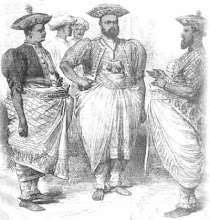
By Stewart Bell
NationalPost.com, Kilinochchi
May 04, 2009
For a decade, Kilinochchi was a rebel capital, the hub of a vast swath of northern Sri Lanka that was controlled by the Tamil Tigers guerrillas.
In January, the town fell to government troops and now a small Sri Lankan flag flies in the town centre amid idle transit buses, flattened buildings and shuttered shops.
"They never expected us to reach Kilinochchi and capture it," said Lieutenant-General Jagath Dais, commander of the Sri Lankan Army's 57 Division.
"Still they don't believe it."
But the Sri Lankan army got a shock of its own when it began collecting weapons from the fallen rebels: troops seized an astounding array of arms, from assault rifles to artillery guns, even a battle tank.
Almost 100,000 small arms have been seized, the army said, as well as almost one million rounds of ammunition and nearly 30,000 rebel land mines.
"The amount of weaponry has caught us totally, totally by surprise, because we didn't think smuggling in so many weapons was possible," said Palitha Kohona, Sri Lanka's Foreign Secretary.
At two military bases in Kilinochchi, the National Post was shown weapons the army said it had found in the country's northern jungles.
There were 2,700 improvised explosive devices, 6,300 hand grenades and 4,000 bombs, in addition to anti-aircraft guns, artillery guns, mortars, 33 GPS devices and a half-dozen satellite phones.
But small arms were the most common find, particularly T-56 assault rifles, a Chinese-made copy of the notorious Russian Kalashnikov AK-47.
The Sri Lankan government estimates it has captured rebel armaments worth almost $20-million so far. Almost every day, the military announces more weapons seizures.
Some of the weapons are homemade, like a human torpedo that looks like a two-person metal kayak. Others are more sophisticated and could have only come from the global arms market: multi-barreled rocket launchers and surface-to-air missiles.
According to Jane's Intelligence Review, Cambodia has been a significant source of the Tamil Tigers' weapons. The rest have come from places such as North Korea, Afghanistan, Lebanon, Turkey and Ukraine.
The arms broker behind the purchases is alleged to be Kumaran Pathmanadan, better known as simply KP. "Where money is there, weapons are there," said Lt.-Gen. Dais.
Where did the money come from?
The answer is at the heart of police investigations in several countries, including Canada. The RCMP has been looking into the Canadian fundraising operations of the Tamil Tigers since 2002.
A senior member of the Tigers who surrendered two weeks ago said the rebels had misappropriated money sent from abroad for humanitarian aid and reconstruction after the 2004 tsunami.
"These funds have been utilized for military purposes rather than the welfare of the Tamil people," Daya Master said.
Mr. Kohona said foreign aid money has been pumped into northern Sir Lanka, but there is little to show for it on the ground, while the rebels seem to have had no difficulty buying arms.
"They have raised huge amounts of money overseas, whether through voluntary contributions, intimidation or illegal trade activities," the Foreign Secretary said.
The RCMP filed documents in federal court last month alleging the Tamil Tigers had raised money in Canada through an Ontario non-profit organization called the World Tamil Movement.
A police search of the World Tamil Movement offices in Toronto and Montreal turned up letters instructing the group to help raise money in Canada to finance weapons purchases, police said.
The most recent letter was dated 2006, during a faltering ceasefire. It asked for $7-million to finance purchase of anti-aircraft missiles and artillery, according to the RCMP.
RCMP forensic accounting reports allege that, between 2002 and 2006, the World Tamil Movement in Toronto wired almost $3-million to overseas accounts. Most of it went to a bank account in Kuala Lumpur, Malaysia, that is allegedly linked to the Tamil Tigers.
The World Tamil Movement denies the police allegations.
Intercepted telephone calls have placed KP in Malaysia, Mr. Kohona said. His weapons purchases were delivered to rebel-held northern Sri Lanka aboard smuggling ships.
But some of the shipments also passed through the port of Colombo disguised as ordinary cargo, he said.
"Not many sovereign states in the world, including Sri Lanka, have the sophistication to do that sort of thing," he said.
In addition to weapons, the stockpile of seized items includes Tamil Tigers' uniforms and several personal photo albums with pictures of the guerrilla boss Velupillai Prabhakaran and other Tiger leaders, such as the late S.P. Thamilselvan, whose family lives in Toronto.
One photo album contains photos of a young Tamil woman. The pictures show her posing in a red sari at what looks like her wedding, riding a motorbike and standing with another woman, both of them wearing the striped camouflage uniforms of the Tamil Tigers.
There was no indication of her fate.
The whereabouts of four others was more certain. The army seized red boxes bearing their names and photographs. Inside each box was a neatly folded Tamil Tigers flag.
According to the army, such honours are reserved only for dead Black Tigers, members of the rebel suicide squad.
National Post
sbell@nationalpost.com

No comments:
Post a Comment